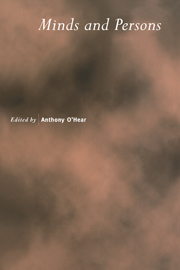Book contents
- Frontmatter
- Contents
- Preface
- Notes on Contributors
- Perceptual, Reflective and Affective Consciousness as Existence?
- The Domain of Folk Psychology
- Minds, Persons and the Unthinkable
- Moderately Massive Modularity
- A Theory of Phenomenal Concepts
- Free Will and the Burden of Proof
- Materialism and the First Person
- Language, Belief and Human Beings
- Human Minds
- Non-Personal Minds
- Personal Agency
- Mental Substances
- Mind and Illusion
- Index
A Theory of Phenomenal Concepts
Published online by Cambridge University Press: 04 August 2010
- Frontmatter
- Contents
- Preface
- Notes on Contributors
- Perceptual, Reflective and Affective Consciousness as Existence?
- The Domain of Folk Psychology
- Minds, Persons and the Unthinkable
- Moderately Massive Modularity
- A Theory of Phenomenal Concepts
- Free Will and the Burden of Proof
- Materialism and the First Person
- Language, Belief and Human Beings
- Human Minds
- Non-Personal Minds
- Personal Agency
- Mental Substances
- Mind and Illusion
- Index
Summary
1. There is widespread agreement that consciousness must be a physical phenomenon, even if it is one that we do not yet understand and perhaps may never do so fully. There is also widespread agreement that the way to defend physicalism about consciousness against a variety of well known objections is by appeal to phenomenal concepts (Loar, 1990; Lycan, 1996; Papineau, 1993; Sturgeon, 1994; Tye, 1995, 2000; Perry, 2001). There is, alas, no agreement on the nature of phenomenal concepts.
2. Concepts are mental representations of worldly entities—things, events, states, properties etc. They are exercised whenever we under-go cognitive mental states. One cannot notice something, recognize it, make a judgment about it without conceptualizing it in some way, without bringing it under a concept. A child who is unable to count may see four pieces of candy but he/she cannot notice that four pieces are present. A dog may hear a Beethoven symphony, but it cannot recognize the sounds as being a Beethoven symphony.
3. Phenomenal concepts are the concepts we exercise when (but not only when) we notice or become aware of the phenomenal character of our experiences and feelings via introspection. Our experiences have phenomenal character whether or not we attend to them, but when we notice how an experience feels, what it is like, in doing so we are bringing it beneath a phenomenal concept. Without phenomenal concepts, we would be ‘blind’ to our phenomenal feels (Dretske, 1995; Tye, 1995), just as the child who cannot count is ‘blind’ to the fact that there are four pieces of candy in front of her.
- Type
- Chapter
- Information
- Minds and Persons , pp. 91 - 106Publisher: Cambridge University PressPrint publication year: 2003
- 15
- Cited by



